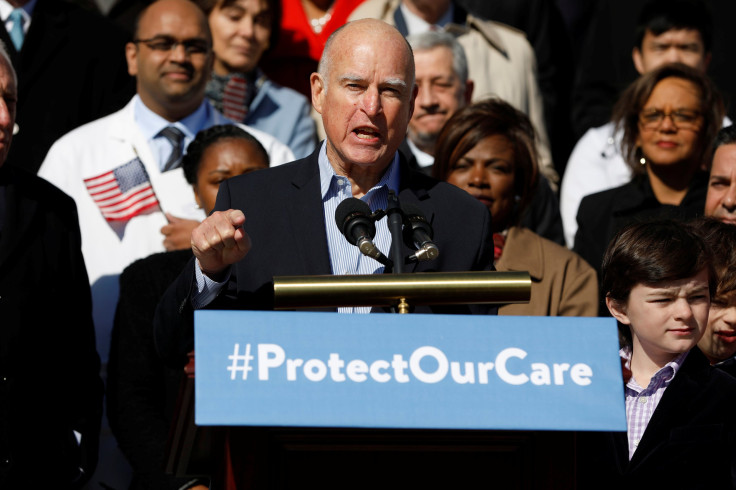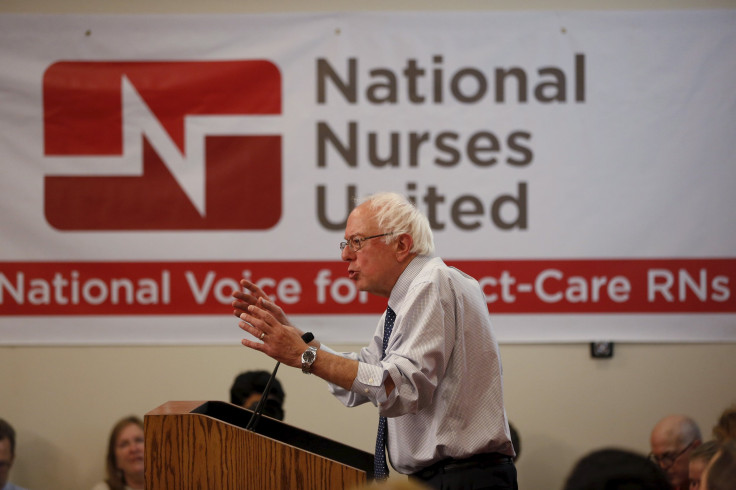California Health Care Bill: Big Corporate Money Opposes Single-Payer Proposal

Update at 9:35pm ET on 4/26/17: The Associated Press reports that the California Senate Health Committee passed the single-payer healthcare bill. The bill now advances to the state's Senate Appropriations Committee.
As health care premiums rise and insurers threaten to leave Obamacare’s state exchanges, polls show that a majority of Americans now support the creation of a universal, government-funded health care program. The so-called single-payer system has been a long-sought goal of progressive groups, who now hope that California lawmakers will pass a bill to create such a system. Proponents hope the system could then begin moving the United States to follow Canada, which saw its own national single-payer system first begin in the province of Saskatchewan.
But before that happens, single-payer proponents are going to have to overcome powerful resistance. While California is known as a liberal stronghold, industry groups with a financial interest in blocking the measure are lining up in opposition — and they have poured cash into the campaigns of key state lawmakers who will decide the fate of the bill.
Read: California Drought Officially Over, Governor Jerry Brown Announces
Since the 2010 election, the 24 lawmakers on the two California legislative committees that will consider the single-payer legislation have collectively received more than $819,000 in donations from the industry groups that are officially opposing the measure. The cash haul includes more than $80,000 to the chairmen of the Assembly and Senate health committees, the latter of which is set to consider the legislation at a public hearing Wednesday.
The groups opposing the bill are listed on a new state report. It also lists the bill’s supporters — primarily grassroots advocacy organizations and labor unions rather than corporate groups.
In addition to the cash that has flowed to the individual legislators from corporate groups opposing the legislation, California’s Democratic and Republican parties received more than $2.2 million from the same groups in the last four election cycles. House Speaker Anthony Rendon, Senate President Kevin De Leon and Gov. Jerry Brown, all Democrats, have also separately received a combined $370,000 from the groups. Brown recently expressed skepticism about the single-payer legislation.
The figures come from an International Business Times review of data from the National Institute on Money In State Politics.
Those campaign donations are just the ones from groups identified as opposing the specific single-payer bill in California’s legislature — which is a fraction of the money that has gone to lawmakers from the larger health industry that is likely to try to shape or oppose the bill if it moves forward. Since the 2010 election, donors from the health and insurance sectors have given $4.8 million to the 24 members of the legislature’s health committees, and another $3.4 million to Brown, Rendon and De Leon.
“The California Bill Is A National Model”
Over the last decade, proposals to expand government-sponsored single-payer healthcare programs have run into a wall of opposition from corporations, who have at times relied on coalitions of Republicans and conservative Democrats to block the initiatives.
During the debate over the Affordable Care Act, for instance, the health insurance and pharmaceutical industries successfully persuaded a Democratic White House and Democratic-controlled Congress to drop plans to create a government-run “public option” to compete with private insurers. The industries also got crucial assistance from Democratic Sen. Joe Lieberman of Connecticut, who helped them stop a proposal to lower the Medicare eligibility age.
Corporate donors last year spent millions to defeat a single-payer ballot measure in Colorado — and the campaign against the initiative was supported by key Democratic Party powerbrokers. A similar fight could be shaping up over the single-payer proposal in Democratic-leaning California, where the state's senior Democratic senator Dianne Feinstein (who has received more than $1 million from health industry donors) faced intense criticism this week for declaring her opposition to the idea of creating a single-payer health care system.
In this latest health care battle in the Golden State, Democrats Sen. Toni Atkins, who serves on the Senate health committee, and Sen. Ricardo Lara introduced the “Healthy California Act“ in February. The legislation would guarantee coverage to all California residents and implement a “comprehensive universal single-payer health care coverage and a health care cost control system,” while ensuring that members “shall not be required to pay any premium, copayment, coinsurance, deductible, and any other form of cost sharing for all covered benefits,” according to the text of the bill. It would also allow Californians to choose their providers, instead of selecting from a list of in-network doctors. The state government would be the financier — or single payer — of guaranteed health care benefits for all Californians.
Proponents say such initiatives do not represent a government takeover of the healthcare system, but simply make the government the guarantor and primary sponsor of basic medical services. In the California proposal, those services would likely be funded by taxes on employers and employees, along with the federal money that currently comes to the state for Medicaid and Medicare.
“We have the chance to make universal healthcare a reality now. It’s time to talk about how we get to healthcare for all that covers more and costs less,” Lara said in a statement last month.
The legislation has been endorsed by the California Nurses Association, which has long argued for a single-payer system and which has endorsed single-payer supporter Lt. Gov. Gavin Newsom in the upcoming gubernatorial election.
“We’ve been trying to expand healthcare to everyone for over 100 years, and it’s always been blocked by the health care industry,” Idelson told IBT. “We believe the California bill is a national model that other states will follow.”

Champions of single-payer systems have come close to implementing their preferred plan in California before. In 2006 and 2008 the legislature sent single-payer plans to the desk of Gov. Arnold Schwarzenegger, who vetoed both bills. Schwarzenegger received more than $2.2 million from donors in the health care and health insurance sectors.
In an April letter to the Senate Health Committee — endorsed by the the California Chamber of Commerce, America’s Health Insurance Plans and many of California’s largest health insurance companies and chambers of commerce — opponents called the bill a “job killer” that would result in “significant budget shortfalls” that “would ultimately require drastic cuts in services.”
The letter, written by California Chamber of Commerce policy advocate Karen Sarkissian, cited a 2008 analysis of the single-payer bill that died on Gov. Schwarzenegger's desk. Back then, the California legislature’s nonpartisan Analyst’s Office estimated the single-payer proposal would cost $252 billion by 2015-16, and would run a $46.2 billion deficit, even when including new taxes that were part of the proposal.
“There’s A Pretty High Price Tag”
According to state documents reviewed by IBT, the new single-payer legislation is being opposed by a coalition of business groups, including private health insurers and their trade associations. Among the most powerful corporations trying to stop the bill are Anthem, Blue Cross, Health Net and Kaiser Permanente. Those groups have together spent more than $71 million on California politics in the last decade.
When the bill comes before the Senate Health Committee, it will face a panel of members who have collectively received more than $357,000 in campaign donations from the groups listed as opposing the legislation. Among the top recipients are Democrats, including the Committee's Chairman Sen. Ed Hernandez, Sen. Richard Roth, and Atkins, one of the bill’s sponsors.
If the bill is passed by the Senate, it will move to the Assembly’s health committee, which is chaired by Democratic Assemblyman Jim Wood — who has received more than $42,000 from the groups opposing the bill in just the last two election cycles. Among his top contributors are union groups, like the California State Council of Service Employees, and groups from the health care industry, such as Blue Shield of California.
Wood has been noncommittal on whether he supports the single-payer proposal: He told Capitol Weekly last month that “Historically, there’s a pretty high price tag” on such an idea, and added, “If we’re going to go it alone, I hope we have a strong financing mechanism to do that. Maybe California becomes a leader on this issue.”
That sentiment was echoed by Brown, who last month told reporters, “Where do you get the extra money?” He said the single-payer concept “is called ‘the unknown by means of the more unknown’... In other words, you take a problem and say, ‘I am going to solve it by something that’s...a bigger problem,’ which makes no sense.”
During his election campaigns, Brown has received more than a quarter-million dollars from the groups opposing the bill. That includes big checks from major health industry players. Health Net gave him $54,400 for his 2014 campaign; so did Anthem and Blue Shield of California. The California Nurses Association made a smaller contribution, giving $27,200 to his 2014 campaign.
The Nurses Association is among the most powerful members of the coalition pushing the single-payer legislation. In all, labor organizations have given $9,910,621 to Senate and Assembly committee members since 2009. The state report on the bill showed more than 200 groups listed as official supporters of the bill. Whereas most of the opponents are corporate groups, most of the groups supporting the bill are progressive, labor and community groups, although some coalitions of health care providers, like the California Physicians Alliance, also support the bill.
In all, they contributed more than $1.9 million to health committee members since the 2010 election, and nearly $800,000 during the 2016 election cycle alone.
© Copyright IBTimes 2025. All rights reserved.






















